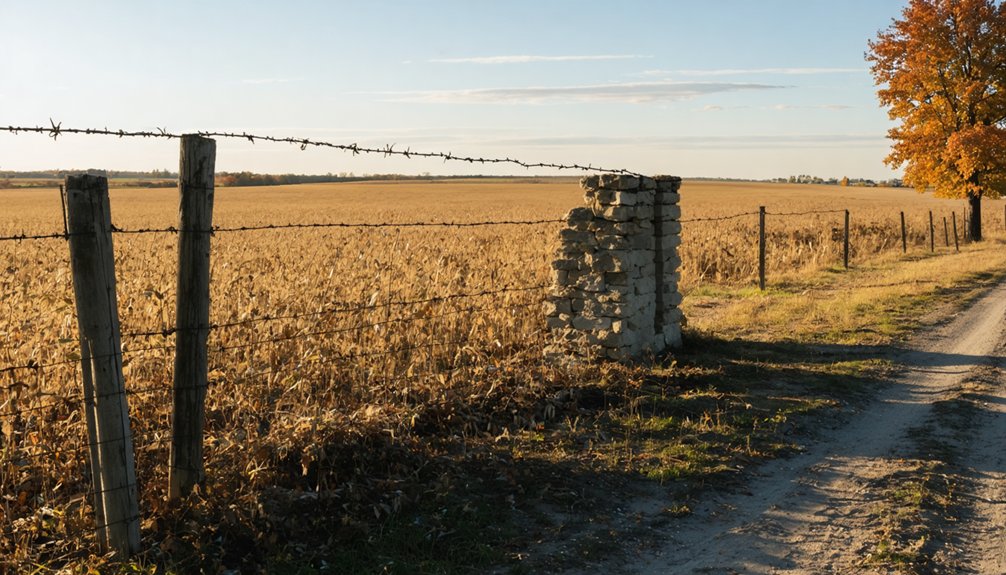You’ll find Coltonville’s ghostly remains in DeKalb County, Illinois, where a once-bustling frontier settlement thrived in the 1830s. Founded by Rufus Colton around his tavern, the town briefly served as the county’s first seat of government and hosted the initial Commissioner’s Court. When the railroad bypassed Coltonville in 1881, the settlement’s fate was sealed. Today, only farmland and a historical marker commemorate this pioneering community’s fascinating rise and fall.
Key Takeaways
- Coltonville was established in the 1830s around Rufus Colton’s tavern but is now completely abandoned, with only farmland remaining.
- The town’s decline began after being bypassed by the Chicago, Springfield and St. Louis Railroad in 1881.
- Despite hosting DeKalb County’s first Commissioner’s Court, Coltonville lost its bid for county seat, accelerating its eventual abandonment.
- A historical marker installed in 1917 commemorates the site of the first court session held on July 1, 1837.
- Once a thriving frontier settlement with a post office, distillery, and commercial services, Coltonville became deserted by the late 19th century.
The Birth of a Frontier Settlement
As pioneers pushed westward into the Illinois frontier in the 1830s, Coltonville emerged as one of DeKalb County’s earliest settlements, establishing itself before the rise of more prominent towns like DeKalb and Sycamore.
You’ll find its origins deeply rooted in frontier dynamics, where settlers encountered an unbroken wilderness of prairie and timber.
The settlement grew around a tavern operated by Rufus Colton, which served as more than just a drinking establishment.
Like many frontier taverns, it became the heart of community life – an essential hub for gathering, trade, and communication.
Settlers chose this location strategically, drawn by its fertile soil, access to water, and abundant game.
The pioneers’ choice was no accident – they sought land that could sustain life and provide the resources needed to thrive.
While the community remained small, it exemplified the self-sufficient nature of early frontier life.
The area had been a thriving Indian village before European settlers arrived, making it an attractive location for early development.
Life Along the Kishwaukee River
While glacial forces shaped the Kishwaukee River basin over hundreds of thousands of years, this waterway became central to life in Coltonville and surrounding settlements.
You’ll find evidence of both the Illinoian and Wisconsinan glaciers in the river’s distinctive features, including the large rounded rocks known locally as “hard heads” and the prominent Marengo Moraine that defines the landscape.
The early inhabitants encountered a complex network of waterways, with the Kishwaukee River stretching 63 miles through multiple counties. Today, its clear waters and gravel provide excellent conditions for paddling and wildlife viewing.
Native Americans likely relied on the river’s resources, while European settlers faced challenges from extensive wetlands and periodic flooding. The Potawatomi and Mascouten tribes were among the indigenous peoples who made their homes along these waters.
They’d eventually transform the landscape through systematic ditching and drainage projects, converting what was once wetland slough into productive farmland that would shape the region’s future.
Notable Early Residents and Leaders
The dynamic figure of Rufus Colton shaped early Coltonville through his political influence and entrepreneurial spirit. As DeKalb County Clerk in the 1830s-40s, he wielded significant power and established his tavern as a crucial community hub.
You’ll find his most notable achievement was hosting the first DeKalb County Commissioner’s Court at his home on July 11, 1837.
While Colton dominated the political dynamics of early Coltonville, records of other early settlers remain scarce. The small community, drawn to the Kishwaukee River’s resources, consisted mainly of farming families whose names haven’t survived in historical documents. The area originally thrived as a small farming hamlet in the 1800s.
After Colton’s failed attempt to secure county seat status through a manipulated election, the settlement’s influence waned, and its residents dispersed, many possibly relocating to Sycamore or DeKalb. The town’s decline accelerated rapidly after losing the county seat to Sycamore in 1840.
A Brief Reign as County Seat
You’ll find that Coltonville’s reign as DeKalb County seat proved remarkably short-lived, lasting only from 1839 to 1840 despite Rufus Colton’s political maneuvering as Court Clerk.
A humble wooden courthouse structure was built in Sycamore to replace Coltonville, measuring just 20 by 30 feet across two stories.
The town’s initial advantage stemmed from hosting the county’s first court session in July 1837 at Colton’s home, establishing it as an early governmental hub.
Sycamore’s superior location and growing influence ultimately led county leaders to transfer the seat there in 1840, dealing Coltonville a blow from which it would never recover.
Controversy over the county seat location persisted well into the future, with seat disputes continuing during construction of later courthouses.
Political Power Shift
During DeKalb County’s formative years in 1837, Coltonville emerged as a brief but significant political center when it secured the coveted position of county seat.
You’ll find that political maneuvering by Rufus Colton, the County Court Clerk, played a pivotal role in establishing the town’s initial authority. The first court sessions and county governance meetings took place in Colton’s own house, marking the town’s prominence in local affairs.
However, Sycamore soon challenged Coltonville’s status, offering superior geographical positioning and expanding infrastructure. The transition was complete when a log structure courthouse was built in Sycamore in 1839.
County Government Operations
As DeKalb County’s first administrative hub, Coltonville established foundational government operations in 1837 through Rufus Colton’s private residence.
You’ll find that the initial court session on July 1, 1837, marked the beginning of organized judicial proceedings in the county, with Colton serving as the court clerk.
During its brief tenure as county seat from 1839 to 1840, Coltonville managed essential government functions from this makeshift center.
Administrative tasks included processing land records, collecting taxes, and conducting local court sessions. A primitive log structure courthouse was built in 1839, setting a precedent for future county buildings.
While no permanent courthouse was constructed during this period, the temporary arrangement helped establish basic county governance.
Though Coltonville’s official role lasted only a year before moving to Sycamore, you can still trace the roots of DeKalb County’s governmental structure to this pioneering settlement.
Sycamore’s Rising Influence
The struggle for DeKalb County’s seat of government intensified in 1837 when Rufus Colton attempted to secure Coltonville’s position through a manipulated election. By notifying only Coltonville residents about the vote, Colton’s scheme backfired when the Illinois General Assembly annulled the results.
Like the ancient fig-mulberry trees of Greece, Sycamore’s prominence emerged swiftly after a sheriff’s court order mandated sessions be held there. The town, formerly called Orange, solidified its position by auctioning village lots to fund a new courthouse and jail.
Captain Eli Barnes’s construction of what became the Sycamore Hotel symbolized the town’s growing status. Meanwhile, Coltonville’s decline proved swift and decisive – the settlement vanished entirely after losing its bid for county seat, joining Brush Point as another failed contender in DeKalb County’s early political landscape.
Economic Growth and Development
You’ll find that Coltonville’s early economic foundation rested on farming and basic commercial services, including general stores and blacksmith shops serving local residents.
The town’s promising start included the establishment of a post office in 1838, suggesting initial commercial growth and community development.
However, Coltonville’s economic potential was severely limited when it was bypassed by the railroad, causing trade and commerce to shift toward better-connected neighboring towns.
Early Business Ventures
Business activity in Coltonville flourished during its early years, marked by diverse commercial ventures that served both residents and travelers.
You’d find the town’s vibrant tavern culture centered around Rufus Colton’s establishment, which became a popular gathering spot for locals and visitors alike.
The settlement’s commercial landscape included essential services like a post office, general stores, and blacksmith shops.
In 1840, Colton partnered with Phineas Stevens to establish a distillery, though this venture faced significant business challenges and ultimately proved unprofitable.
Despite housing the first DeKalb County Commissioner’s Court, Coltonville’s economic aspirations took a hit when it lost its bid for county seat status to nearby Sycamore.
This setback, combined with other ventures’ limited success, began to impact the town’s growth potential.
Railroad Impact on Trade
While local commerce struggled in Coltonville’s early years, a more significant economic force would reshape the region’s trade landscape – railroad development.
You’ll find that rail networks, particularly the linkages between major lines like the Alton & St. Louis and Chicago & Alton railroads, dramatically improved regional connectivity throughout Illinois.
These new transport corridors revolutionized trade efficiency by reducing travel times and costs compared to traditional methods. The railroads’ integration with existing river and road networks created a robust transportation system that accelerated the movement of agricultural products and manufactured goods.
With substantial investments from cities like Alton ($151,000) and counties like Sangamon and Madison ($250,000), the expanding rail infrastructure transformed isolated communities into interconnected commercial hubs.
The Railroad’s Fateful Decision

As the Chicago, Springfield and St. Louis Railroad plotted its course in 1881, you’ll find their railroad strategy deliberately bypassed Coltonville.
The decision wasn’t arbitrary – the company’s planners focused on maximizing revenue through direct routes between major population centers, leaving smaller settlements to fend for themselves.
The economic implications proved devastating for Coltonville. Without rail access, you couldn’t effectively compete with neighboring towns that enjoyed faster, cheaper transportation of goods and people.
Businesses and residents soon relocated to rail-served communities, accelerating Coltonville’s decline. While other towns along the CS&StL line thrived with new opportunities, Coltonville’s isolation from the rail network sealed its fate.
This pattern repeated across Illinois, where a town’s survival often hinged on whether it secured a coveted spot along the expanding railroad system.
From Bustling Town to Abandoned Land
The bustling streets of 1837 Coltonville painted a vastly different picture from what you’d find today.
Where you once would’ve encountered a thriving community with stores, taverns, and blacksmith shops, you’ll now see only farmland stretching across the Illinois prairie.
The town’s decline exemplifies the harsh pioneer challenges faced by early Midwestern settlements.
Early settlers faced brutal realities as their Midwestern frontier dreams crumbled into ghost towns and forgotten histories.
After losing the county seat to Sycamore and being bypassed by the railroad, Coltonville’s community dynamics shifted dramatically.
Businesses shuttered, residents relocated to more prosperous areas, and the once-vibrant settlement slowly faded away.
By the late 19th century, abandoned buildings marked the town’s final chapter.
Today, only a historical marker on Coltonville Road remains to tell the story of this vanished pioneer town.
Legacy in DeKalb County History

Despite its eventual decline, Coltonville played a pivotal role in shaping DeKalb County‘s early administrative foundation. You can trace its significant legacy to July 1, 1837, when the county’s first court session was held in Rufus Colton’s home.
Today, you’ll find a historical marker, placed by the Daughters of the American Revolution in 1917 and updated in 2006, commemorating this pivotal moment.
While Coltonville lost the heated county competition to Sycamore in 1839, its influence on early settlement patterns and transportation routes can’t be understated.
The town’s story exemplifies the dynamic nature of frontier development and continues to resonate in DeKalb County’s cultural memory.
Through preserved documentation and historical records, Coltonville’s legacy endures as a reflection of the region’s pioneering spirit and early governance.
What Remains Today: A Historical Marker
Standing proudly on Coltonville Road east of North First Street near Sycamore, Illinois, a granite marker serves as the sole physical memorial to Coltonville’s historic legacy.
Installed in 1917 by the DeKalb County Historical Society and Daughters of the American Revolution, this monument commemorates the county’s first court session held on July 1, 1837, at Rufus Colton’s log cabin.
You’ll find the site beautifully maintained thanks to a $15,000 redesign in 2006 by the DeKalb County Board, showcasing the community’s commitment to preserving local history.
While no original structures remain from the vanished town of Coltonville, the marker’s historical significance endures, marking the spot where early political controversies shaped DeKalb County’s future before Sycamore emerged as the permanent county seat.
Frequently Asked Questions
Were There Any Significant Crimes or Lawless Incidents in Coltonville?
You won’t find juicy crime history here – beyond Rufus Colton’s sneaky political tricks with county seat voting, there’s no documented evidence of significant lawlessness or need for serious law enforcement in this town.
What Happened to the Residents After Coltonville Was Abandoned?
You’ll find that most residents’ relocation centered around Sycamore, which became the county seat. They scattered throughout DeKalb County, seeking better economic opportunities as their community impact faded.
Did Any Native American Artifacts Survive From the Original Village?
You’ll find numerous Native American artifacts survived, including stone tools, pottery shards, and bone implements. Professional excavations near Coltonville guaranteed artifact preservation and protected their cultural significance.
What Was the Highest Recorded Population of Coltonville?
You’ll find in Coltonville’s history that the town reached its peak population of 1,029 residents in 1865, marking the highest point in Coltonville demographics before its eventual decline into abandonment.
Were There Any Schools or Churches Established in Coltonville?
Picture a frontier village where learning happened in homes, not schoolhouses. You won’t find records of established schools or churches in historical documents, though informal gatherings likely occurred in taverns and private residences.
References
- https://en.wikipedia.org/wiki/Coltonville
- https://97zokonline.com/coltonville-il-a-ghost-town-just-29-miles-from-rockford/?trackback=fbshare_top
- http://livinghistoryofillinois.com/pdf_files/Coltonville
- https://drloihjournal.blogspot.com/p/lost-towns-of-illinois-series.html
- https://www.youtube.com/watch?v=93k0qtvzkn4
- http://genealogytrails.com/ill/dekalb/mayfield-history.html
- https://illinoisstateonline.com/ghost-towns-in-illinois/
- https://cultivateconnections.org/legends-coltonville/
- https://en.wikipedia.org/wiki/List_of_ghost_towns_in_Illinois
- https://archive.org/download/fromoxentojetshi00davy/fromoxentojetshi00davy.pdf



